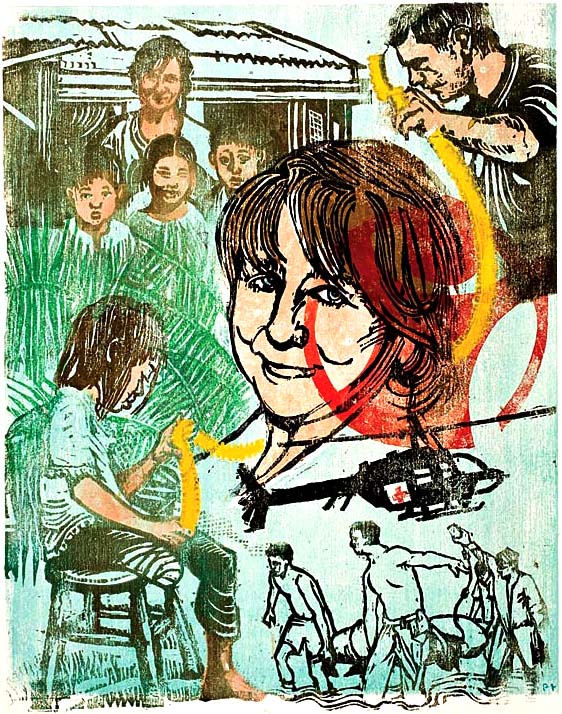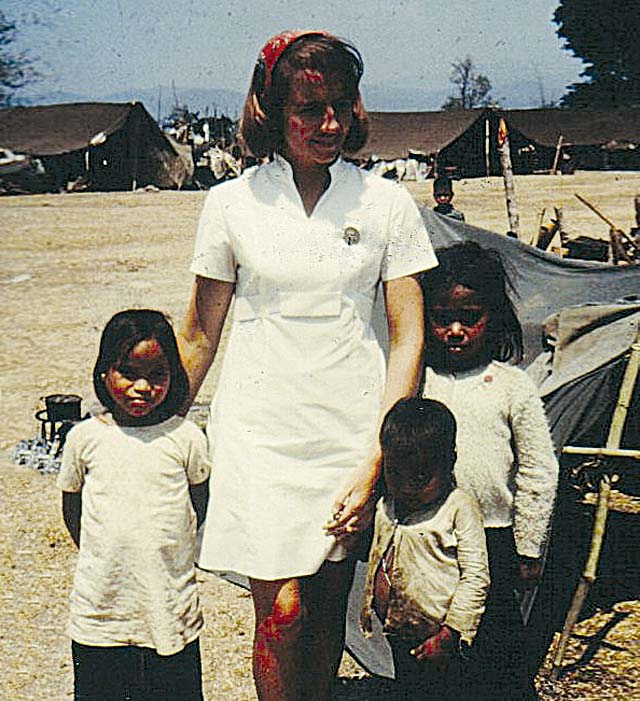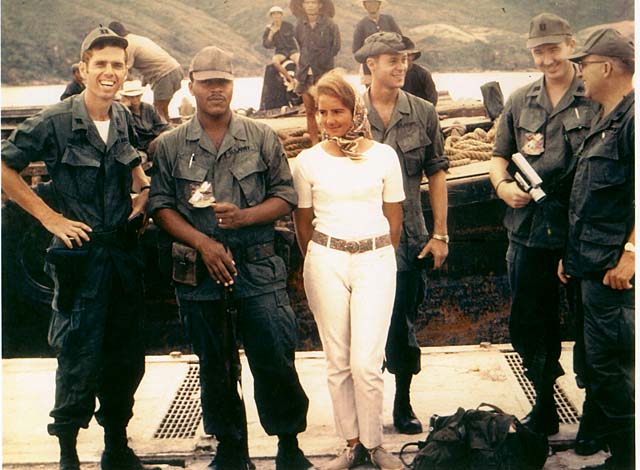 |
||||||||||||
|
March/April 2017
BY ANNE WATTS At home in Wales in September 1967, I answered an ad in Nursing Times: “Save the Children fund requires more nurses for their expansion programme of a rehabilitation and training centre for widows and orphans in Qui Nhon, South Vietnam.” I would serve two tours in Vietnam: one year in Qui Nhon, another in Kontum. Nothing prepared me for coming face to face with the ghastly evidence of what war does to a civilian population. The Centre housed fifty children. Of these, 70 percent were war wounded; the remainder were ill with tropical diseases and chronic medical conditions. Even as a nurse who’d witnessed the tragic deformities cause by thalidomide and had worked with severely ill children and babies, my introduction to such cruel and avoidable suffering was shocking and painful. Yet Ken Shapiro, a correspondent for Stars and Stripes, described the SCF Centre as “the Oasis.” It was indeed a refuge, a place of peace and calm, with two objectives: to provide nursing and convalescent care for children, thus relieving the hard-pressed local hospitals and orphanages, and to provide child care and vocational training for young widows. American personnel were drawn to the Oasis. First the doctors, who generously gave their time. Then others came by to be with the kids. Our living conditions—simple but adequate—were enhanced by service members “redistributing Army goods.” They installed a generator, an icebox, and a pump for the well. Others brought food and medicine. A group of Seabees made little desks for our schoolroom, built a concrete paddling pool, and landscaped the garden, surrounding it with a white picket fence draped with scarlet bougainvillea. All in the two days their ship was in port. I sometimes wondered how a war could be fought with well-stocked bars, jukeboxes, candy, and the latest movies. It always seemed so at odds with the reality of the situation. The Americans seemed to take the United States with them wherever they went, but my mixed feelings were made more so by their tremendous generosity from which I and my colleagues at the Children’s Centre often benefited.
Multiple shards of shrapnel had torn into the right side of the face of eight-year-old Hue and peppered her leg. Her shattered bones left no option but amputation just below the knee. Her parents and little brother had been killed in the same gunship attack; the child was timid, withdrawn, and given to tearful bouts. In an attempt to hide the ugly scarring that puckered her soft cheek, Hue insisted on wearing her thick, glossy hair combed forward onto her face. She never played or talked much with the other children and generally could be found sitting on a wooden bench, face turned to the wall. One afternoon a U.S. Army general arrived to learn more about our project and how his men could help. His driver, barely out of his teens, sat with shoulders hunched, head down, clearly a damaged soul. I offered him a soft drink. “No thank you, ma’am,” he stuttered, looking up briefly with haunted eyes. Over the next few weeks, the general and his driver visited regularly, and a friendship developed between Hue and the traumatized soldier. Hesitantly and cautiously, he began to alight from the Jeep, raise his head, look around nervously for Hue. She, in turn, began to notice the strange young man who spoke to no one, and she looked for his visits. A tentative smile was exchanged between them, then another. Slowly, he gained her confidence. Then one day he sat down in the dirt, removed his boots and started cutting them up. He fashioned a crude sling out of the canvas boots and painstakingly fitted it to the ragged stump which had once been her leg.
Slowly, he taught her to walk. Back straight, head up, no limping. Well, not much. Then he went to the local market and bought a small mirror, a comb, a length of yellow ribbon and a piece of elastic. Gently coaxing the curtain of hair from her scarred face, he slipped the yellow ribbon over her head. Tilting her chin upward, he smiled at the child, took her hand, and together they walked the length of the compound. Hesitantly at first, then gaining confidence, Hue held up her head, laughing into his anxious face and limping awkwardly but happily on her new leg. No longer silent and withdrawn, the soldier began to smile and talk. He spoke of his parents and his eight-year-old sister he loved so much. He hadn’t dared hope that he might live to see his family again. Hue had given him the spark that had made him embrace the possibility that he might actually survive and make it back home. He was back, and so was Hue. He had made her feel the way a pretty little girl should. Each had broken through the paralysis caused by the horrors they’d experienced.
Ten-year-old Ba was traveling to market with her mother when the rickety bus hit a mine. Ba was the only survivor of the carnage. Passers-by spotted the half-dead child and took her to the local hospital in Qui Nhon. It was several days before Ba realized she had lost both of her legs at the buttocks. A few days later she was transferred to our convalescent center for post-operative nursing and as much tender loving care as was humanly possible. How do you heal a child who has lost everything? Father, mother, brother, sisters, legs. All gone in an instant, just like that. As days turned to weeks, this little girl’s character and personality began to emerge. Even with the pain and shock, she couldn’t suppress a mischievous nature that kept us all on our toes. As her wounds healed and her condition became more bearable, she became the leader of a gang of pranksters. At that time, there was only one limb-fitting center in South Vietnam. Based in Saigon, the facility was basic and inundated with maimed servicemen. Somehow an appointment was made for Ba. The 360-kilometer journey south was accomplished by hitching rides on military aircraft. It took several stages in C130s or helicopters, hopping from Qui Nhon to Nha Trang, and on to Saigon. The military did its best to accommodate civilian personnel involved in humanitarian work. After her final fitting, Ba and I traveled back to Qui Nhon. Her new legs were ugly, heavy, cumbersome contraptions. Ba hated them and flatly refused to wear them, so we traveled with them strapped to the side of my weekend bag while I, as usual, carried the child perched on my hip. Her pretty dress was always arranged carefully to conceal the fact that she had only half a body. We took a taxi to Tan Son Nhut and began the long wait to hitch a ride back to Qui Nhon. We slept fitfully through the tropical night and were eventually called and given a seat on a U.S. Air Force hospital plane transporting wounded men to Clark Air Base in the Philippines. It was scheduled to stop at Qui Nhon and take on more casualties from the 67th Evac Hospital. I strapped myself in, Ba on my knee as always, her dress carefully arranged. I watched the nurses with professional admiration as they quickly and efficiently tended each soldier with a quip and a ready smile. Our seat was alongside a litter on which lay a very badly injured soldier. His name and date of birth were on a label tied to a button on his blue hospital shirt. His eyes, sunk in his ashen face, seemed decades older than his twenty-one years. I watched the blood drip slowly through the tubing inserted into his neck and saw that his right arm ended abruptly in a bloodied, bandaged stump just below his elbow. His left hand was heavily bandaged and consisted of a lobster claw formed by a thumb and forefinger only. He was shivering, and focusing hard on trying to pick up a cigarette that lay on the blanket that covered his chest. Ba watched him carefully, seeming to realize the importance of allowing him the dignity of trying to pick it up himself. She smiled at him. There was no way you could ignore Ba’s smile. The soldier tried to smile back, and Ba picked up the cigarette, lit it, expertly took a couple of puffs, and placed it gently between his lips. The look of peace and contentment that came with his first draw made me wonder why I had never taken up the habit. A few minutes later, he turned his head slowly and spoke to Ba. “Hi, kid. Speak English?” Ba nodded, and asked, “You sick?” He sighed. “No, tired. I’m going home.” He looked at me with a puzzled expression. I explained I was a British nurse caring for wounded children in Qui Nhon. “Can I hold her, ma’am? Please? Hey, kid, you’re just like my little sister, you know that?” I panicked for a second. I didn’t want him to know about her legs. I wasn’t sure how he would react, maybe he was too ill to notice. But I placed her gently on his thighs, hoping he wouldn’t notice how abnormally light she was. It was then, in a moment of blinding pain and anger, that I realized he had no thighs: He too had lost his legs. His blanket had hidden from view what I should have seen. The breath stopped in my throat. Ba knew. I felt her torso stiffen, but her expression didn’t change. She smiled and stroked his face, and he spoke to her softly of his folks, his brothers, and his sister back home in Oklahoma. How he would see them soon. He spoke of his girl and how he wished he had had time to buy her a gift. His face bloodless, his breath ragged, his eyes dulled with pain. Ba just kept smiling, and softly, sweetly, sang her song for him. I couldn’t utter a word. I was possessed by a complicated mixture of anger, compassion, and grief. We three had been brought together in a macabre drama, written by politicians in a comfortable universe far, far away.
The 67th Evac consisted of a cluster of Quonset huts huddled together at one end of the airstrip, just over the back wall of our children’s rehabilitation center. The huts housed the broken young men of America, wounded in body and spirit. The casualty receiving area looked out onto the tarmac where choppers landed with sickening regularity. Teams of medics, men and women, hunched over to avoid the spinning rotor blades, ran out trundling gurneys between them, and unloaded the men from the Dustoff choppers. I stood in awe of those courageous Huey pilots who rescued the wounded; and I so admired those nurses and doctors working in such circumstances. For the female nurses, life was particularly restrictive. It was difficult and unwise for them to leave their bases because of the unstable security situation, and most times they were too exhausted anyway. But some sought a little change of scene by visiting our children’s center. In turn, they suggested we come to their hospital and do a bit of volunteering. The first time I went over to the 67th I was sent to the surgical unit to sit with a badly wounded soldier, hooked up to blood and saline drips. I could see only one of his eyes through his heavy bandaging—and that eye looked abnormally bright and not focusing well. A chest drain protruded from the bloodied bandages around his torso; the fluid level barely moved, so shallow was the swing up, down, up, down in the glass tube, marking his labored breathing. Nothing was draining into the bottle of his urinary catheter. Not a drop. It was not a good sign. I sat down quietly beside his cot and took his hand with a gentle squeeze. That eye swiveled in my direction, and he slowly, softly returned the squeeze. He wanted something. “Water?” I asked. The eye blinked and he gave my hand another soft squeeze. He was unable to suck on a straw, so I dampened some cotton swabs and brushed them across the soldier’s lips. His colorless tongue peeped out, and I kept on squeezing little drops of fluid onto his dry and bloodless lips. Every now and again there was a slight pressure on my hand, almost imperceptible but definitely there. His surgeon approached, then crouched down, put his hand under the pillow beneath the mortally wounded head, and brought out a letter. “Jeff, there’s a letter for you. Would you like to hear it? Is it okay for Anne to read your letter to you?” Jeff squeezed my hand. I opened the sealed letter and slowly began reading it out loud. It was a letter from a wife to her husband. Her love for him lifted off the page, and I felt embarrassed voicing the intimate words meant only for him.
It wasn’t a long letter and I sensed that she, bursting with the joy of new life, somehow knew what he was facing. She was willing her husband to survive. I felt embarrassed and privileged and heartbroken all at the same time to be the messenger. Jeff squeezed my hand when I said his wife’s name. But after I reached the end of the letter, the touch of his hand faded and the fluid level in the chest drain stilled. Jeff had quietly slipped away.
|
||||||||||||
|
|
||||||||||||
|
||||||||||||
8719 Colesville Road, Suite 100, Silver Spring. MD 20910 | www.vva.org | contact us |
||||||||||||























 It took several visits, much concentration, and the addition of buckles, straps, and laces. Then he cut a piece of aluminum pipe to size. The protective rubber tip on the end of the pipe was carved from the heel of his boot. Hue cooperated and became increasingly excited as her new leg took shape.
It took several visits, much concentration, and the addition of buckles, straps, and laces. Then he cut a piece of aluminum pipe to size. The protective rubber tip on the end of the pipe was carved from the heel of his boot. Hue cooperated and became increasingly excited as her new leg took shape.